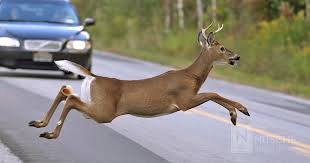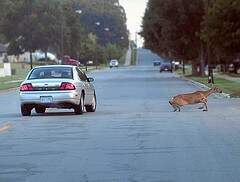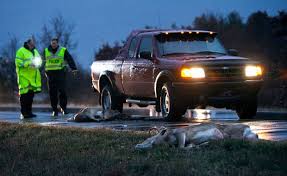
Brought to you by WBIW News and Network Indiana
Last updated on Thursday, November 8, 2018
(UNDATED) - As the breeding season for deer approaches, the chances of encountering deer on Indiana roadways increases significantly.
By remembering a few preventive measures, you can minimize the chances of deer-vehicle collisions.

Annually, there are more than 14,000 deer-vehicle collisions reported in Indiana.
If you live where deer are abundant, such as in suburban areas, or anywhere that field and forest meet, it is important to know what preventive measures you can take to reduce the likelihood of a collision and what to do if you are involved in one.
While you can't eliminate the possibility of running into a deer on the road, you can minimize the risk of severe damage to you or your vehicle.
When Do Deer-Vehicle Collisions Happen?
Deer movements are not entirely random. Your chance of seeing deer wandering across roads differs depending on the time of day and the time of year. Your chance of actually hitting a deer also depends on the unique circumstances of the situation.
Be Especially Careful when Driving During these Conditions:

How Can You Prevent Injuries from Accidents?

What to Do if You Hit a Deer
1. Move your vehicle to a safe place if possible. Pull to the side of the road if you can and turn on your hazard lights.
2. Call the police. If there are no other vehicles involved and the driver and passengers are unharmed, a shortened report can probably be made. If the deer is still alive, don't approach it yourself; wounded deer are unpredictable and can be dangerous. Let the police officer approach and euthanize the deer if necessary.
3. You have the right to keep the deer for your own use with the proper permit. A police officer, conservation officer, district biologist, DNR property manager, or assistant DNR property manager can all issue permits for you to legally possess the deer. Refer to the list of licensed Indiana deer processors if you need a place to take your deer for butchering. Also, consider donating the meat to a food bank. Participating processors will take deer for donation at no cost to the donor. The Sportsman's Benevolence Fund covers the cost of butchering and ensures that the meat goes to those in need. Keep in mind that it is illegal to sell most wildlife parts in Indiana, including wild venison.
4. As with any vehicle accident, follow the officer's instructions. After the report is finished you will be free to go.
1340 AM WBIW welcomes comments and suggestions by calling 812.277.1340 during normal business hours or by email at comments@wbiw.com
© Ad-Venture Media, Inc. All Rights Reserved.